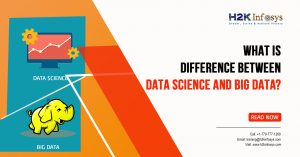Many data scientists place restrictions on their job searches before they are able to find employment with the best organizations that hire data scientists. Data Science should logically only apply to positions with the title “data scientist.”
Data science, however, is a talent that goes far beyond jobs requiring the title of “data scientist.”
Big data refers to the requirement for all businesses and institutions to handle, gather, filter, and comprehend massive amounts of incoming data.
Data science will always find applications in industries including business, education, finance, and government because the internet has permanently merged with these fields. To learn more, check out the Data science online training.
The following is a list of the several prospects that data scientists can pursue:
1.Data Science
The formal job title “data scientist,” which is now an exceptionally common opportunity available on every job board from every industry, cannot be left out of a list of career prospects for data scientists.
Organisations may access a vast amount of data over the internet, but understanding it requires specialised skills.
Because of this, businesses now need to hire data scientists, which is why the field is predicted to expand faster than the average for all other industries.
When a person with a background in data science holds the title of “data science,” many different tasks are expected of them at work. Their main responsibility is building data models for data analysts, enabling them to produce understandable reports for institutional executives.
Data scientists can be compared to an improved form of computer security software.
Data scientists labour to gather data, organise it, and maybe delete damaging or unnecessary inputs. They also seek to ensure that these undesirable inputs are never introduced into the system in the first place.
The fact that “data science” is described as a formal job title is evidence of its wider applicability in various career fields. Data scientists can use a variety of techniques to accomplish these goals, and not all circumstances need using the same coding, gathering, and filtering techniques.
2.Machine Learning Engineer
To construct software that can efficiently learn a single activity at superhuman levels, for instance, data scientists who also serve as machine learning engineers employ statistics and more advanced coding languages.
For instance, AlphaZero, a computer program, consistently defeats the top chess players in the world using machine learning technology. While AlphaZero cannot learn to speak, it can essentially acquire an endless number of new strategies for winning in chess, making it extraordinarily adaptive at a single talent.
Data scientists handle all of this, taking raw data and transforming it into knowledge that is helpful to both specialists and non-experts alike by making it comprehensible and, most crucially, self-generating.
To put it another way, data scientists can utilise data to build robots that can learn specific subjects at rates and levels much beyond what is humanly possible.
Engineers who specialise in machine learning make, on average, $110,000 a year.
3.Data Engineers
Generally speaking, the main distinction between scientists and engineers is that scientists conduct research and develop models. Engineers, on the other hand, employ those models to enhance systems.
Together with data scientists, data engineers use their models to enhance the functionality of institutional systems. To put it another way, data engineers must interpret data. Computers and other internet-based technology are still being used, therefore they are operating at full capacity.
This typically means that building data ecosystems for the free flow of data falls under the purview of data engineers. Computing speed is slowed down when data cannot flow freely.
For instance, there is a data flow barrier between the finance and human resources departments. Emails sent and received by these departments would then be delayed.
Data engineers need to build systems that learn, but machine learning engineers are already doing that. This is the main distinction between the two types of engineers.
An average data engineer earns $101,000 a year.
4.Data Analyst
To assist firms in understanding data, data analysts collaborate with data scientists. Sadly, raw data is made up only of ones and zeros. The vast majority of individuals who use the internet on a regular basis don’t understand the language of code, such as HTML, and take it for granted.
Decisions in companies are made using data reports. As a result, creating data reports is the main duty of data analysts.
Data analysts utilise data models to produce data reports. Data scientists build models from raw data and translate the results of those models into terms that are simple enough for the general public to understand.
Despite the possibility of working as a data scientist’s assistant, the median yearly salary for data analysts is from $70,000 to $85,000.
Conclusion
Check out the online Data science course to learn more about the various Job opportunities in Data science.


























